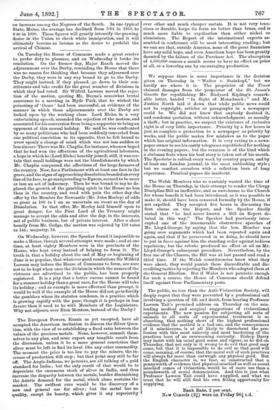On Tuesday the House of Commons made a great resolve
to prefer duty to pleasure, and on Wednesday it broke its resolution. On the former day, Major Rasch moved the .adjournment over the Derby, reminding the House that there was no reason for thinking that because they adjourned over the Derby, they were in any way bound to go to the Derby. They might instead, if they pleased, go down to their con- stituents and take credit for the great number of divisions in -which they had voted. Sir Wilfrid Lawson moved the rejec- tion of the motion, quoting Mr. Burns's somewhat brutal assurance to a meeting in Hyde Park, that he wished the poisoning of Orme ' had been successful, as evidence of the manner in which these adjournments over the Derby are looked upon by the working class. Lord Elcho, in a very .entertaining speech, seconded the rejection of the motion, and accounted for his conversion from being a supporter to being an opponent of this annual holiday. He said he was confronted by so many politicians who had been suddenly converted from -one political conviction to its opposite, that he felt bound to avow openly a change of mind which was not less sudden or less sincere. There was Mr. Chaplin, for instance, who now hoped that he had won the affections of the agricultural labourers, a hope in which he (Lord Elcho) heartily joined; still, it was cer- tain that small holdings were not the blandishments by which Mr. Chaplin conquered the affections of the large farmers of the country. Now, for a Parliament with at least one foot in the grave, and the signs of approaching dissolutionbranded on every line of its face, to go masquerading to Epsom, seemed to be more -or less an act of indecency. Then he was bound to say he de- zplored the growth of the gambling spirit in the House no less than in the country, and read with pain the other day the offer by the Member for Newcastle (Mr. John Morley) of odds so great as 100 to 1 on so uncertain an event as the day of Dissolution. In that offer, Mr. Morley laid himself open to great danger, for the First Lord of the Treasury might manage to accept the odds and alter the day, in the interests, not of public business, but of private interest. After a short homily from Mr. Gedge, the motion was rejected by 158 votes to 144; majority, 14.


































 Previous page
Previous page